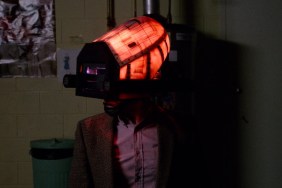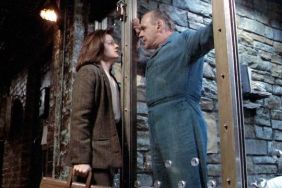
As you sit at your desktop or laptop or stare into your brand new smart phone that has a ridiculous orgy of different apps for all sorts of, let’s face it, mostly completely unnecessary things, you more than likely already know before even beginning this retrospective that David Cronenberg’s 1983 cyberpunk masterpiece is just as relevant today as it ever was perhaps more so. Been on Facebook lately? Composed a tweet today? Conversed via a Skype call? Of course you have and more than likely this is a daily ritual for most of you. Some of us seem to completely lose the plot the second our broadband connection starts to give like it was losing a limb. The film was released when the video cassette was the dominant format of video entertainment, winning its battle against the Betamax.
If the Cronenberg of the ’80s could see into the future (who knows, he probably can, the talented bastard) he would have probably have shit in his genius pants. Videodrome is not primarily a fear of a physical threat from technology but a melancholic glimpse into a horrifying technological dystopia.
Human experience and evolution through technology, the politics of mass communication, sex, violence, fetishism topped off with some of the most eyeball-searingly shocking body horror imagery horror audiences will have seen for years make for a heady cinematic brew that no one retrospective could fully encapsulate, but here I will offer up my own humble subjective experience of this fantastic film, keeping within Shock Till You Drop’s running theme of technology as a conduit of evil. Those of you who whole heartedly agree or emphatically disagree I can only point you towards the comments box that should be found at the foot of this article to voice said opinions.
We havent even begun the story and already we begin to dip our toes into the sea of technological prophesying that runs rampant here.
Here, in 1983, Cronenberg predicts the use of an audio visual wake up call a VHS sequence trigged by an off-screen timer or clock personally addressing our protagonist of the film Max Ren, played by the always dependably watchable James Woods. Here this kind of device is only speculation fast forward to present day and this kind of operation is not impossible to preform via an iPhone. Nothing, when you consider other technological advances that pop up everyday. Consider Nokia’s latest technological development that could have been lifted straight from one of Cronenberg’s movies a tattoo that will vibrate whenever your Nokia receives a call! Savage new times? If so, for whom?
Ren, president of Civic TV, a local television station, begins the film a blank slate, out of sync with his emotions, his experiences and his sexuality. It is through his encounters that his, to use a very Cronenbergian turn of phrase, “flesh,” is changed to the “new flesh” through a series of what we can only assume are hallucinations, marvellously brought to life by the make-up effects artist legend, Rick Baker. You know him as the man responsible for some of Hollywood’s most audacious horror effects, landing Oscar nods for films like Ed Woods and An American Werewolf In London. Who can forget the image of James Woods leaning so far into his television screen to meet Nikki’s lips, literally losing his physical self in the screen?
“Videodrome” is introduced to Max Ren via a pirate signal seemingly emanating from somewhere in Thailand. Harlan, one of his technicians, later reveals that it was intercepted from Pittsburgh and seems to simply be death footage of a Chinese woman being slaughtered in a room outfitted with electrified walls.
Ren approaches the disturbing new footage as he does with all the other stuff he finds in his travels at arm’s length, an indifference to the material that is almost disturbing. This is all merely in the pursuit of financial gain to him, as he puts it, in an interview on a local chat show, he, “is supplying the people with an harmless outlet way to live out their fantasies.” Here Ren meets Nikki (Deborah Harry lending some Blondie pop culture appeal to the proceedings) a young woman who seems to have strong sadomasochistic tendencies. It’s here that things begin to go wrong for Ren. He badgers Nikki into agreeing to a date with him. The following night at Ren’s apartment Nikki decides to watch Videodrome, claiming that it “turns her on.” They have sex with the videotape playing in the foreground. Ren pierces Nikki’s ear at her request while the girl on the tape in the background is brutally tortured and murdered. This is the first of the astonishing hallucinations – the room they are f**king in now appears to have morphed into the exact same room in the videodrome. They have both become unknowing test subjects.
The battle for the mind of North America will be fought in the video arena. The “Videodrome.”
Professor Brian O’ Bilivion is the complete extreme of man evolving with technology the professor so committed to his ideals of the video world that he decides that one can continue to live after death recording thousands upon thousands of video cassettes of himself engaging in most conceivable conversational situations until his questions could be answered. At one point in the film he reveals that “Oblivion” is his video name or handle and he believes that one day we all will carry such monikers another sound Cronenberg prophecy here could it be possible to spend so much time online, on your PS3 or Xbox that it will become normal practice to go by your gamer tag or online ID? Co-creator of the Videodrome signal, O’ Bilivion is exterminated when he realizes the evils that his invention is being used for. His daughter carries on his cause by using the endless library of videotapes seeing this as a substitute for her fathers conscious. A virtual self.
Hidden in the Videodrome is a subliminal signal that is proved to trigger fatal side affects in subjects first come the hallucinations, then comes the embolism. Max is contacted by spokesman of Spectacular Optical Barry Convex (Leslie Carson) who reveals the true nature behind the Videodrome signal to “toughen up” the American citizen who choose to watch the Civic TV and channel 85 a device that could potentially control the world. The hallucinations hit Ren at many horrible angles, from haunting images of Nikki imploring him to whip her, to “open those neural floodgates,” to witnessing his entire abdomen develop a gaping vagina, primed for fucking by a new system from the minds behind Videodrome with a throbbing, living, video cassette.
Ren has now become technology itself, more than likely to soon become outdated and obsolete bumping into a homeless selling mechanical toy monkeys who complains to Max about the short life span of the batteries of his toys. Ren’s image fills the screen man’s portable TV as the man continues his speech Ren is now a puppet or pawn rapidly losing himself in an underground technological war welcome to the modern American consumer as seen through the eyes of one mister David Cronenberg a man who may be just as excited by our technological evolution as he is terrified by it.
Videodrome is a potential mind-controlling, population control device, hitting the people of North America at their most vulnerable spots their private viewing times, capitalizing on their basic carnal desires to watch sexually explicit material or more aggressive tendencies to watch something a little more violent and visceral. With less and less of us watching TV and using the internet, advertising can come at us from all angles.
Sure,chat to a long lost buddy overseas, but while you do… Wear Gap. Smoke Marlboro. Eat some Macdonalds. Push the button. Dance, Monkey, Dance!









